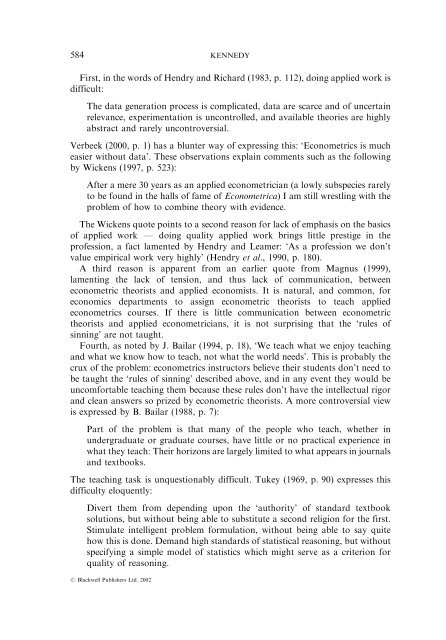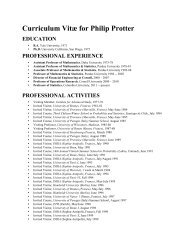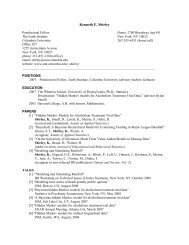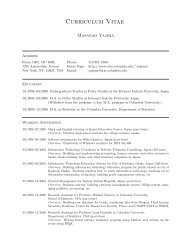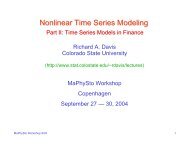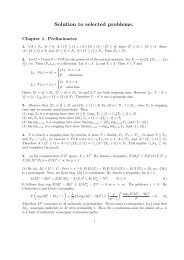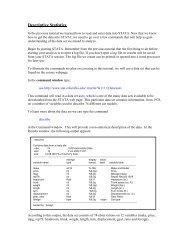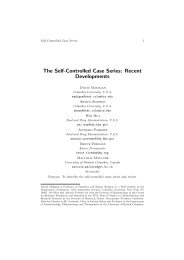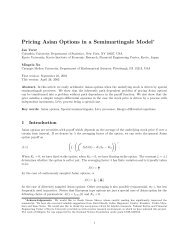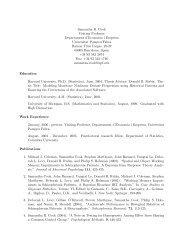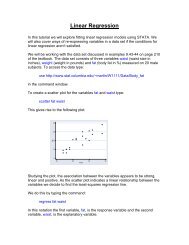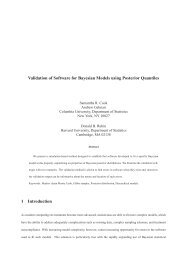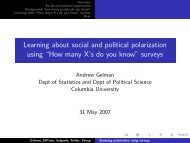sinning in the basement: what are the rules? the ten commandments ...
sinning in the basement: what are the rules? the ten commandments ...
sinning in the basement: what are the rules? the ten commandments ...
You also want an ePaper? Increase the reach of your titles
YUMPU automatically turns print PDFs into web optimized ePapers that Google loves.
584 KENNEDY<br />
First, <strong>in</strong> <strong>the</strong> words of Hendry and Richard (1983, p. 112), do<strong>in</strong>g applied work is<br />
difficult:<br />
The data generation process is complicated, data <strong>are</strong> scarce and of uncerta<strong>in</strong><br />
relevance, experimentation is uncontrolled, and available <strong>the</strong>ories <strong>are</strong> highly<br />
abstract and r<strong>are</strong>ly uncontroversial.<br />
Verbeek (2000, p. 1) has a blunter way of express<strong>in</strong>g this: ‘Econometrics is much<br />
easier without data’. These observations expla<strong>in</strong> comments such as <strong>the</strong> follow<strong>in</strong>g<br />
by Wickens (1997, p. 523):<br />
After a mere 30 years as an applied econometrician (a lowly subspecies r<strong>are</strong>ly<br />
to be found <strong>in</strong> <strong>the</strong> halls of fame of Econometrica) I am still wrestl<strong>in</strong>g with <strong>the</strong><br />
problem of how to comb<strong>in</strong>e <strong>the</strong>ory with evidence.<br />
The Wickens quote po<strong>in</strong>ts to a second reason for lack of emphasis on <strong>the</strong> basics<br />
of applied work — do<strong>in</strong>g quality applied work br<strong>in</strong>gs little prestige <strong>in</strong> <strong>the</strong><br />
profession, a fact lamented by Hendry and Leamer: ‘As a profession we don’t<br />
value empirical work very highly’ (Hendry et al., 1990, p. 180).<br />
A third reason is app<strong>are</strong>nt from an earlier quote from Magnus (1999),<br />
lament<strong>in</strong>g <strong>the</strong> lack of <strong>ten</strong>sion, and thus lack of communication, between<br />
econometric <strong>the</strong>orists and applied economists. It is natural, and common, for<br />
economics departments to assign econometric <strong>the</strong>orists to teach applied<br />
econometrics courses. If <strong>the</strong>re is little communication between econometric<br />
<strong>the</strong>orists and applied econometricians, it is not surpris<strong>in</strong>g that <strong>the</strong> ‘<strong>rules</strong> of<br />
<strong>s<strong>in</strong>n<strong>in</strong>g</strong>’ <strong>are</strong> not taught.<br />
Fourth, as noted by J. Bailar (1994, p. 18), ‘We teach <strong>what</strong> we enjoy teach<strong>in</strong>g<br />
and <strong>what</strong> we know how to teach, not <strong>what</strong> <strong>the</strong> world needs’. This is probably <strong>the</strong><br />
crux of <strong>the</strong> problem: econometrics <strong>in</strong>structors believe <strong>the</strong>ir students don’t need to<br />
be taught <strong>the</strong> ‘<strong>rules</strong> of <strong>s<strong>in</strong>n<strong>in</strong>g</strong>’ described above, and <strong>in</strong> any event <strong>the</strong>y would be<br />
uncomfortable teach<strong>in</strong>g <strong>the</strong>m because <strong>the</strong>se <strong>rules</strong> don’t have <strong>the</strong> <strong>in</strong>tellectual rigor<br />
and clean answers so prized by econometric <strong>the</strong>orists. A more controversial view<br />
is expressed by B. Bailar (1988, p. 7):<br />
Part of <strong>the</strong> problem is that many of <strong>the</strong> people who teach, whe<strong>the</strong>r <strong>in</strong><br />
undergraduate or graduate courses, have little or no practical experience <strong>in</strong><br />
<strong>what</strong> <strong>the</strong>y teach: Their horizons <strong>are</strong> largely limited to <strong>what</strong> appears <strong>in</strong> journals<br />
and textbooks.<br />
The teach<strong>in</strong>g task is unquestionably difficult. Tukey (1969, p. 90) expresses this<br />
difficulty eloquently:<br />
Divert <strong>the</strong>m from depend<strong>in</strong>g upon <strong>the</strong> ‘authority’ of standard textbook<br />
solutions, but without be<strong>in</strong>g able to substitute a second religion for <strong>the</strong> first.<br />
Stimulate <strong>in</strong>telligent problem formulation, without be<strong>in</strong>g able to say quite<br />
how this is done. Demand high standards of statistical reason<strong>in</strong>g, but without<br />
specify<strong>in</strong>g a simple model of statistics which might serve as a criterion for<br />
quality of reason<strong>in</strong>g.<br />
# Blackwell Publishers Ltd. 2002


